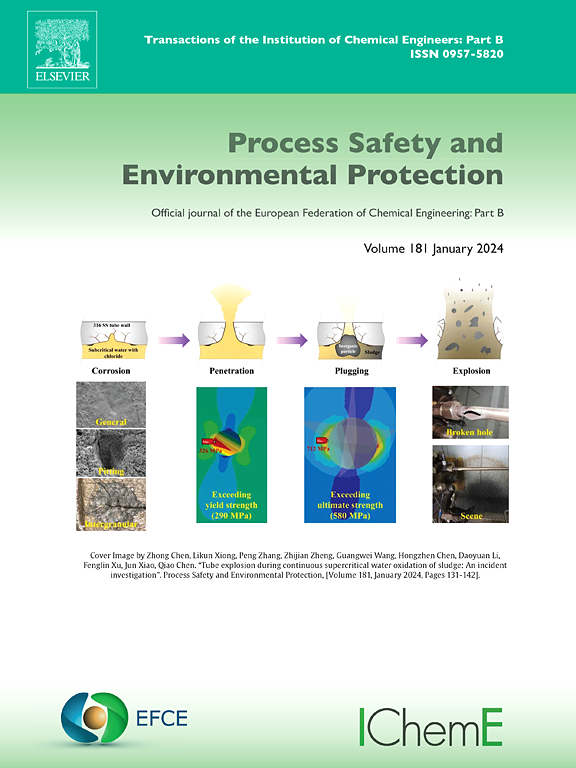综合综述了合成聚合物对污泥厌氧消化的资源和价值:现状、机制和未来潜力
IF 7.8
2区 环境科学与生态学
Q1 ENGINEERING, CHEMICAL
引用次数: 0
摘要
合成聚合物的存在,包括水溶性聚合物(WSPs)和微塑料(MPs),对污泥厌氧消化(AD)的运行稳定性和效率提出了挑战。本文综述了近十年来的科学文献,阐述了合成聚合物对污泥AD资源化利用和高价值利用的影响。研究表明,虽然低浓度的合成聚合物可以增强AD,例如通过促进污泥造粒,但高浓度或其有毒的渗滤液会持续损害AD过程。这种损伤表现为关键酶活性的抑制,微生物群落的破坏,以及甲烷和氢等有价值产物的产量减少。对潜在机制的详细分析表明,抑制通过多种途径进行,主要是有毒增塑剂的浸出,活性氧的诱导,以及对微生物聚集和电子转移至关重要的细胞外聚合物物质的不利物理化学改变。该综述进一步提供了各种缓解策略的评估,包括热水解、导电材料修正和生物电化学系统。进一步的研究应通过密度泛函理论和分子动力学模拟等理论方法,在分子水平上阐明合成聚合物与微生物群落的相互作用机理,并开发新的添加剂或预处理技术,以提高厌氧消化的效率和价值。本文章由计算机程序翻译,如有差异,请以英文原文为准。
A comprehensive review of synthetic polymers stress on sludge anaerobic digestion resource and value: Current status, mechanisms, and future potential
The presence of synthetic polymers, including water-soluble polymers (WSPs) and microplastics (MPs), presents a challenge to the operational stability and efficiency of sludge anaerobic digestion (AD). This review summarized a decade of scientific literature to elucidate the impact of synthetic polymers on the resource utilization and high-value utilization of sludge AD. It was demonstrated that while synthetic polymers at low concentrations could enhance AD, for instance by promoting sludge granulation, higher concentrations or their toxic leachates consistently impaired the AD process. This impairment manifested as the inhibition of key enzymatic activities, disruption of microbial communities, and reduced yields of valuable products such as methane and hydrogen. A detailed analysis of the underlying mechanisms reviewed that inhibition proceeds via multiple pathways, chiefly the leaching of toxic plasticisers, the induction of reactive oxygen species, and the adverse physicochemical alteration of extracellular polymeric substances, which were vital for microbial aggregation and electron transfer. The review further provided an assessment of diverse mitigation strategies, including thermal hydrolysis, conductive material amendment, and bioelectrochemical systems. The work highlighted that the further effects should clarify the interaction mechanism between synthetic polymers and microbial communities at the molecular level through theoretical methods such as density functional theory and molecular dynamics simulation, and develop new additives or pretreatment technologies to enhance the efficiency and value gained through anaerobic digestion.
求助全文
通过发布文献求助,成功后即可免费获取论文全文。
去求助
来源期刊

Process Safety and Environmental Protection
环境科学-工程:化工
CiteScore
11.40
自引率
15.40%
发文量
929
审稿时长
8.0 months
期刊介绍:
The Process Safety and Environmental Protection (PSEP) journal is a leading international publication that focuses on the publication of high-quality, original research papers in the field of engineering, specifically those related to the safety of industrial processes and environmental protection. The journal encourages submissions that present new developments in safety and environmental aspects, particularly those that show how research findings can be applied in process engineering design and practice.
PSEP is particularly interested in research that brings fresh perspectives to established engineering principles, identifies unsolved problems, or suggests directions for future research. The journal also values contributions that push the boundaries of traditional engineering and welcomes multidisciplinary papers.
PSEP's articles are abstracted and indexed by a range of databases and services, which helps to ensure that the journal's research is accessible and recognized in the academic and professional communities. These databases include ANTE, Chemical Abstracts, Chemical Hazards in Industry, Current Contents, Elsevier Engineering Information database, Pascal Francis, Web of Science, Scopus, Engineering Information Database EnCompass LIT (Elsevier), and INSPEC. This wide coverage facilitates the dissemination of the journal's content to a global audience interested in process safety and environmental engineering.
 求助内容:
求助内容: 应助结果提醒方式:
应助结果提醒方式:


